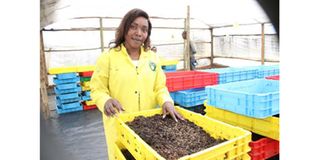Premium
Agriprenuer finds good business in flies and waste

Evelyn Nekesa on her blacksoldier fly farm in Eldoret with some of her products.
Off the busy Eldoret-Kitale Road in Uasin Gishu, one finds Senior Estate, a fast-growing middle-income residential area.
The estate is dotted with bungalows and maisonettes as well as apartments.
It is here that Evelyn Nekesa runs Fair and Sustainable Insect Farm, from where she rears black soldier flies.
Seeds of Gold team finds Nekesa supervising her two workers, who are loading wet organic waste onto a machine inside a store that stands next to a greenhouse.
The quarter-acre farm hosts three greenhouses measuring 15 by 3 metres, where production of the flies at various stages takes place. She has named them larvarian, love-cage and hatchery.
“Larvarian is where we feed the insects, in love cage mating happens and at the hatchery, they lay the eggs,” says the farmer, 30.
She started the project in April last year to cash in on the shortage of animal feeds.
“I went for free training at the International Centre of Insect Physiology and Ecology (Icipe) in Nairobi and, thereafter, was given a free black soldier flies kit to start my project.”
During the training, Nekesa says she learnt about crickets but chose black soldier flies because she needed to use their waste as fertiliser for her organic farm.
She feeds the insects fresh market produce that she sources from Eldoret town.
“I get 2.4 tonnes that cost me Sh2,000 daily. This includes transportation and collection costs. I use a hot air dryer to grind and break them into smaller portions so that the flies can consume with ease to grow uniformly. We allow them to ferment for three days before feeding the insects,” says Nekesa, an accountant.
The love section consists of 70 cages where male and female flies mate and lay eggs in a wooden structure. A single fly hatches 300 to 1,000 eggs in seven days. After that they die. The eggs hatch into larvae in about four days.
“I dry in the sun and sell the larvae at Sh100 per kilo to small-scale livestock farmers in Eldoret. We produce up to 130 kilos of larvae on a good day and 50 kilos on a bad day.”
 
Organic fertliser
On the other hand, she dries the waste that comes from the production process and mills to make organic fertiliser.
“Sometimes we, however, mix the waste with the black soldier flies themselves, grind and sell to farmers. We make up 150 kilos of organic fertiliser in a day, selling a 90kg bag at Sh2,500,” explains Nekesa.
The fertiliser is rich in nitrogen, phosphorous and potassium. According to agriculture experts, it enhances soil fertility and contains an element called chitin to boost plant immunity.
Nekesa notes that to run such a business, one does not need to start big.
“Some Sh10,000 is enough. What one needs is black soldier flies and organic waste,” says agriprenuer.
Some of the challenges she has encountered include bad odour from the waste.
“Some neighbours once complained but that time I had used pig waste. I stopped, now I dry and crush the food waste.”
She adds that starting the venture in a rural place can be a challenge due to limited access to food waste.
According to her, the business is good because the insects are rarely attacked by diseases or pests save for mites but they don’t kill them.
Dr Nicholas Syano, a lecturer at Machakos University, observes that use of insects to produce rich protein for livestock and organic fertiliser is a part of climate-smart farming.
“Feeds contribute up to 86 per cent of the costs on the farm. And this is because of expensive protein sources. Using black soldier flies or earthworms helps to lower costs at the farm level,” notes the expert.

